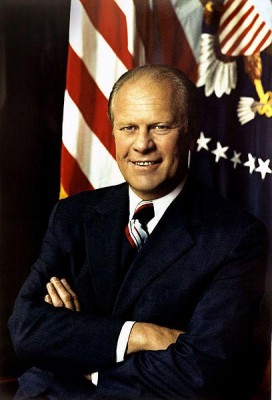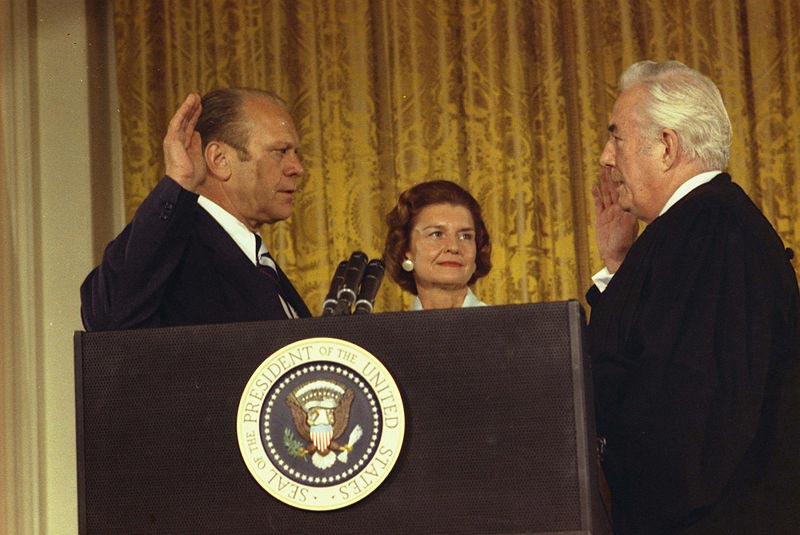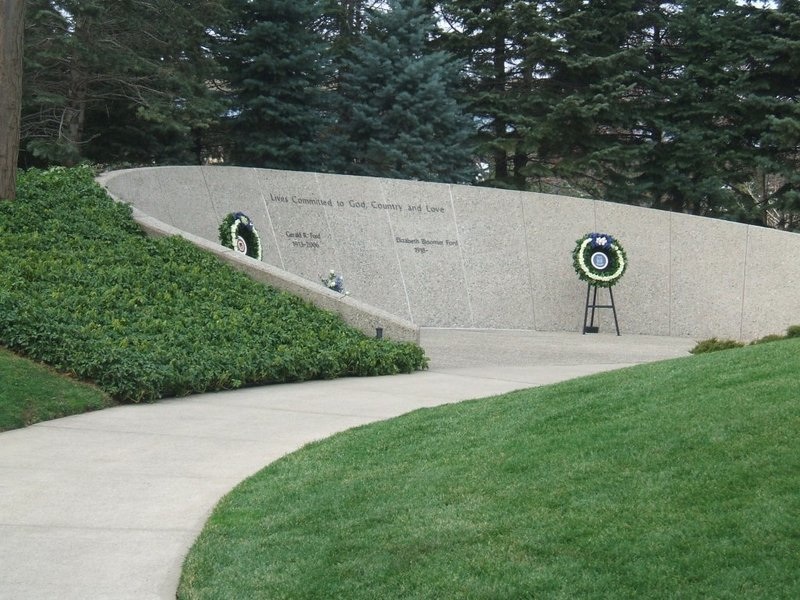| Gerald Ford | |
|---|---|
 |
|
| 38th United States President « Previous Next » |
|
| In office | Aug. 9, 1974 – Jan. 20, 1977 |
| V. President | Nelson Rockefeller |
| Political Party | Republican |
| Personal Info | |
| Born | July 14, 1913 |
| Died | Dec. 26, 2006 (at age 93) |
| Religion | Episcopal |
| School | University of Michigan Yale University |
| Profession | Lawyer |
| Signature | |
| Wife | Betty Bloomer |
| Children | Michael Gerald Ford John Gardner Ford Steven Ford Susan Ford |
| U.S. Presidents 36-43 | |
| 36. Lyndon B. Johnson (1963-1969) | |
| 37. Richard Nixon (1969-1974) | |
| 38. Gerald Ford (1974-1977) | |
| 39. Jimmy Carter (1977-1981) | |
| 40. Ronald Reagan (1981-1989) | |
| 41. George H. W. Bush (1989-1993) | |
| 42. Bill Clinton (1993-2001) | |
| 43. George W. Bush (2001-2009) | |
| List of All the Presidents |
As the 38th President of the United States, Gerald Ford was perhaps the only American President who was never elected to any higher ranking office other than Congress. The former President was born in 1913 at Omaha, Nebraska and was raised in Grand Rapids, Michigan. He was initially known as christened Leslie King, Jr. His parents divorced immediately after their marriage because his mother could no longer endure his father’s heavy drinking and frequent beatings. Her mother remarried again and as a tribute to his kinder step-father, the future President became known as Gerald Ford, Jr. after his step-father, the salesman Gerald Ford.
Gerald Ford’s Early Life
He was an outstanding Boy Scout and earned an Eagle Scout rank. When he studied at the University of Michigan, he became an exceptional football athlete and refused to become a professional football player despite overtures from the Green Bay Packers and Detroit Lions. Instead, he became an assistant coach at Yale and took up law school there where he got his degree. World War II was a time that he served in the Navy and almost lost his life when he almost fell overboard from a ship because of a typhoon. Despite his close brush with death, Ford became a lieutenant commander in the Navy years after the incident.
 Gerald Ford became an accomplished lawyer in Grand Rapids by the late 1940’s, and in 1949 he was voted to Congress. In between those years, he married Elizabeth Bloomer and they were blessed with four children namely: John, Michael, Steven, and Susan. He was re-elected twelve times as a Republican congressman, and got sixty-percent of the vote every time he ran. As House Minority Leader, Ford’s openness and integrity was his trademark and this contributed immensely to his popularity in his twenty-five year stay in Congress. As an appointee to the Warren Commission, Ford provided credible answers to public queries about John F. Kennedy’s assassination. Moreover, two years after his demise, records showed that he was in touch with the FBI about the commission’s discussions whenever possible.
Gerald Ford became an accomplished lawyer in Grand Rapids by the late 1940’s, and in 1949 he was voted to Congress. In between those years, he married Elizabeth Bloomer and they were blessed with four children namely: John, Michael, Steven, and Susan. He was re-elected twelve times as a Republican congressman, and got sixty-percent of the vote every time he ran. As House Minority Leader, Ford’s openness and integrity was his trademark and this contributed immensely to his popularity in his twenty-five year stay in Congress. As an appointee to the Warren Commission, Ford provided credible answers to public queries about John F. Kennedy’s assassination. Moreover, two years after his demise, records showed that he was in touch with the FBI about the commission’s discussions whenever possible.
President Nixon’s Resignation and Ford Becoming President
 In the mid-1960s after becoming one of the Republican leaders in Congress, Ford opposed the social welfare policy of President Lyndon B. Johnson and assailed the creeping military presence of US soldiers in Vietnam. After a spate of scandals that forced Vice President Spiro T. Agnew out of office, Gerald Ford became Vice-President. He was praised publicly by high-ranking politicians and President Richard M. Nixon because of his exemplary congressional record. Secretly, while Ford’s integrity and trustworthiness in Congress were unquestioned, several quarters said he was chosen because of his bland personality that made him credible to both leftists and rightists. Moreover in the mid-1950s, Ford already had close ties with Nixon. Before the Watergate brouhaha, Ford served as the US Vice President for eight months, and the President’s involvement in the scandal forced the latter to abdicate the presidency. Ford became President on August 9, 1974.
In the mid-1960s after becoming one of the Republican leaders in Congress, Ford opposed the social welfare policy of President Lyndon B. Johnson and assailed the creeping military presence of US soldiers in Vietnam. After a spate of scandals that forced Vice President Spiro T. Agnew out of office, Gerald Ford became Vice-President. He was praised publicly by high-ranking politicians and President Richard M. Nixon because of his exemplary congressional record. Secretly, while Ford’s integrity and trustworthiness in Congress were unquestioned, several quarters said he was chosen because of his bland personality that made him credible to both leftists and rightists. Moreover in the mid-1950s, Ford already had close ties with Nixon. Before the Watergate brouhaha, Ford served as the US Vice President for eight months, and the President’s involvement in the scandal forced the latter to abdicate the presidency. Ford became President on August 9, 1974.
Shortly after, Ford raised many eyebrows by exonerating the disgraced ex-President Nixon of any crimes he may have committed during his tenure. Most of the citizenry, who were outraged by the Nixon and Agnew controversy scoffed at the pardon as nothing but a deal that was pre-arranged, which the President adamantly denied. Expectedly, Gerald Ford’s controversial pardon was greeted with widespread indignation and this unfortunately became the defining moment of his tenure. He appointed Nelson Rockefeller as his Vice President, but as a Republican, his initiatives were limited by the Democrats who controlled Congress. Nevertheless, the president initiated the signing of bills that included antitrust laws, reforms in the energy department, deregulation of the securities industries, and tax cuts. His priority though was how to fight high inflation and he did this by ordering the distribution of millions of buttons printed with the word “WIN,” meaning “Whip Inflation Now.” on the faces of the buttons and giving them away to far-flung areas. Unfortunately, this tactic did little to address the problem.
The Watergate scandal was unparalleled in America’s history and Ford was the first President to be chosen under remarkable circumstances. Almost immediately, the President was faced with seemingly daunting tasks. High inflation, a bearish economy, serious energy problems, and maintaining fragile world peace were foremost in Ford’s mind. Excessive spending and government intervention were the traditional ways of solving problems in America, so he devised ways in diverting from this approach. The big picture to President Ford was that he wanted to improve the lives of suffering citizens.
Using the Power of Veto to Divert Inflation
His immediate problem though was heavy opposition from a Democrat-dominated Congress. He went with his initiatives anyway and his first goal was to fight inflation. As the crisis deepened, Ford tried to stimulate the economy by vetoing bills pertaining to military expenditures that could balloon the growing deficit. All in all, in his first year and two months in office, Gerald Ford vetoed thirty-nine bills that were surprisingly sustained by Congress.
To showcase America’s growing prestige and power even after the war was lost in Vietnam and Cambodia, Ford embarked on this vigorous foreign policy. Another pressing issue was averting fresh clashes in the Middle East and he did this by giving military and economic aid to the Israelis and Egyptians. Perhaps the best achievement of President Ford was to persuade the two combating countries to accept an initial peace agreement. On another front, an agreement with Soviet Union was paramount, so he and Soviet leader Leonid I. Brezhnev sought to limit the proliferation of nuclear arms.
“Clumsy” President Ford
During his presidency, President Ford was very robust and athletic, but he was very clumsy slipped and fell in many instances, and it became headline stuff for many years. In one instance, the golf ball from his drive went through throngs of spectators and accidentally hit a woman on the head. The incident was caught live on television, and during Saturday Night Live shows actor Chevy Chase mercilessly mimicked the President’s clumsiness.
Close Encounters with Death
Aside from his detractors, Ford had his share of scary moments in the month of September in 1975 with two demented women named Lynnette ‘Squeaky’ Fromme and Sara Jane Moore. In September 5, 1975, Fromme, a member of a certain Charles Manson pointed a .45 caliber firearm at the President, but the Secret Service quickly came to his aid. Further investigation showed that there was no bullet in the handgun. Another attempt on his life happened in Francisco on September 22, 1975, when Sara Jane Moore, an accountant by profession took aim at the President. Fortunately, Oliver Sipple, a former Marine saw what she was about to do and reached for Moore’s arm, which diverted her aim. President Ford yet again survived another attempt of his life. Curiously, it took the White House three days to publicly thank Sipple, after learning that he was homosexual.
In the year 1976, Ford went for re-election, but bypassed his vice-president and instead went for Senator Bob Dole as his vice-presidential candidate. However, he had a disastrous campaign against Jimmy Carter, a former Georgia Governor. His monumental mistake was that he stated that the Slavic state, Poland, was “independent and autonomous” even though it was like the most of Eastern Europe, which were satellites of a giant communist nation. Amidst his flawed reasoning, Ford insisted theoretically that Soviet dominion of Eastern Europe is a myth, and no such thing can happen under his watch. Public opinion swayed in Carter’s favor because of his outrageous statements, and was ranked historically as among the worst blunders made in any nationally-televised political debate by a presidential candidate.
President Ford’s Passing Away
 On December 26, 2006, the man known as the accidental President passed away at the age of ninety-three years at 6:45 pm at his home in Rancho Mirage, which is one-hundred-thirty miles east of Los Angeles. Betty Ford, his loving wife said “Gerald was filled with the love of God, his family and his country.” Even with his passing, President Gerald Ford Jr. will be remembered as a moderate President who served eight-hundred-ninety-five days in office, which was the fifth shortest term served by any American leader. Nevertheless, he was conservative when it came to the nation’s budget. By using his presidential powers to veto any bill as his ultimate weapon in battling rising deficits, President Ford saved American taxpayers from paying roughly nine-billion dollars as Congress approved forty-five of his vetoes. When President Ford took office, the inflation rate hovered at twelve point two percent, but it was lowered down to four point six percent in the first six months of his tenure in1976. Moreover, in March, 1975, only eighty-four million Americans had jobs, but in July, 1976, almost four million jobs were added.
On December 26, 2006, the man known as the accidental President passed away at the age of ninety-three years at 6:45 pm at his home in Rancho Mirage, which is one-hundred-thirty miles east of Los Angeles. Betty Ford, his loving wife said “Gerald was filled with the love of God, his family and his country.” Even with his passing, President Gerald Ford Jr. will be remembered as a moderate President who served eight-hundred-ninety-five days in office, which was the fifth shortest term served by any American leader. Nevertheless, he was conservative when it came to the nation’s budget. By using his presidential powers to veto any bill as his ultimate weapon in battling rising deficits, President Ford saved American taxpayers from paying roughly nine-billion dollars as Congress approved forty-five of his vetoes. When President Ford took office, the inflation rate hovered at twelve point two percent, but it was lowered down to four point six percent in the first six months of his tenure in1976. Moreover, in March, 1975, only eighty-four million Americans had jobs, but in July, 1976, almost four million jobs were added.
He became a millionaire after his term, a successful publisher of a number of books, was a speaker at corporate events, and had a career with NBC. He became the oldest living ex-president at ninety-three, passing Ronald Reagan for that title. Gerald Ford will always be admired for his sense of duty and his mild personality. Perhaps the best way to describe him is the manner by which he gave back prestige and respect in the presidency. By erasing the bitter memory of the Watergate scandal from the White House, Gerald Ford’s left a legacy of confidence and trust, and the country moved forward ever since.